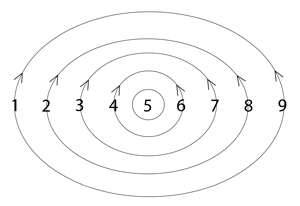experience
2-3-5
Conventional Understanding
We typically think of experiences as things that happen to us. “I had a great experience” or “That experience taught me a lesson.” This view creates a gap between ourselves and what we experience, as if we’re separate from the events of our lives. This separation shapes how we live – we chase “good experiences” and avoid “bad” ones, treating life like a collection of events we need to manage. This limited view has us believing we’re travelers moving through experiences rather than seeing that we are the experiencing itself.
Resonant Understanding
Word Cosmology shows “experience” sharing the same pattern (2-3-5) as “feel your desire” and “physical relationship.” This reveals something surprising – we don’t just have experiences; we unfold as the experiencing process itself.
Think of a dancer dancing. We don’t say dancing “happens to” the dancer or that they “have” a dance. The dancer and dancing are one unified process. Similarly, we aren’t separate from our experiences but appear as the experiencing process itself – like a wave isn’t separate from the ocean but is the ocean in motion.
Expressions Spectrum Analysis
In balance, experience shows up as “consciously aware,” “discover,” and “expressing feeling.” There’s no gap between you and what you’re experiencing. “I am here” and “I love giving” reflect how balanced experience naturally flows without artificial boundaries. “Integrate the information” shows how we naturally incorporate new patterns without fragmentation.
When over-modulated, it shows up as “energy management,” “power,” and “interference.” We strain against the natural flow, trying to manipulate what’s happening. “Condemn” and “industrialization” show how we might mechanize what should flow naturally, turning living experience into production.
When under-modulated, it appears as “not being,” “resistance,” and “delicate.” We feel fragile and reactive, as though experience is something threatening that happens to us rather than the process we are. “Fear of success” and “information dysfunction” show the confusion that comes from this disconnection.
Other expressions like “universal equilibrium,” “vortex,” and “resonance of words” also share this pattern, suggesting broader dimensions of the experiencing process.
Russell’s Cosmogony Connection
Walter Russell described experience beautifully when he wrote:
“The fulcrum of the universe from which actions and reactions extend and return might be likened unto a mirror. As the action walks away from that mirror, it also extends the mirror’s image which walks away with it.”
Experience works like this mirror principle. It’s not something separate happening to us but a continuous cycle of extension and reflection.
Think of a whirlpool in a river. The whirlpool appears distinct but remains inseparable from the river itself. Similarly, experience isn’t something that happens to us but the pattern through which life flows as us.
Practical Implications
This understanding changes how we approach living. Instead of trying to collect positive experiences while avoiding negative ones, we can recognize ourselves as the experiencing process itself.
In practice, this might mean:
- Noticing when you’re trying to control your experience versus allowing it to unfold
- Paying attention to when you feel separate from what’s happening versus being fully present with it
- Recognizing that integrating new information and expressing feelings happen naturally when we don’t resist the process
Our educational systems, therapy approaches, and spiritual practices often assume we’re separate from our experiences. But what if we’re not separate observers of life but the process of life experiencing itself?
By recognizing experience as the process we unfold as rather than events happening to us, we might discover a more integrated way of living – neither controlling life nor being controlled by it, but flowing as the natural expression of life itself.
Walter Russell’s quotes are from his book, “A New Concept of the Universe”.
Related Words:
No results found.


